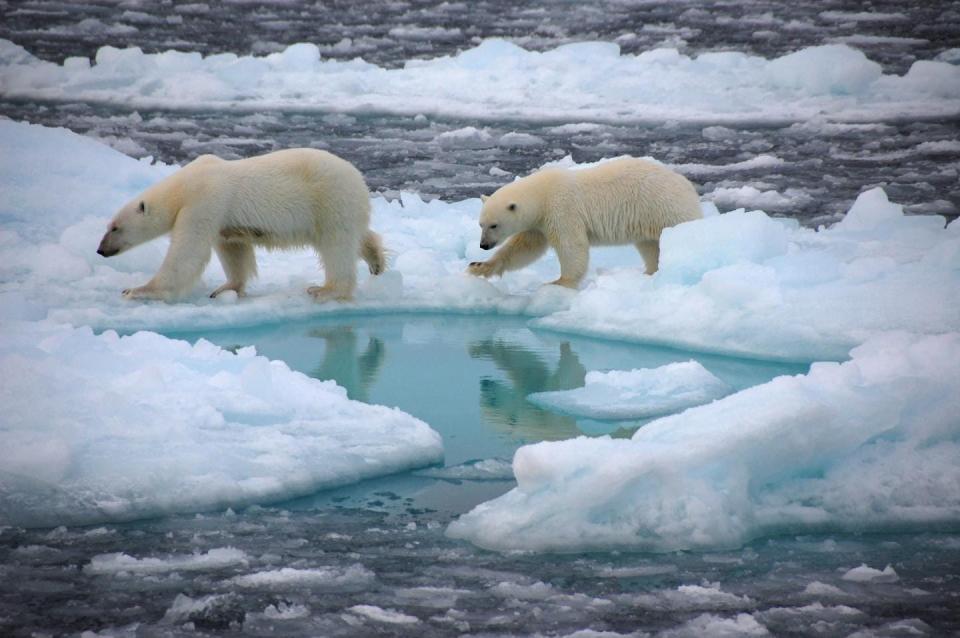The Arctic could become 'ice-free' within a decade, sooner than projected, study says
The Arctic could be "ice-free" in the summertime as soon as the next few years, scientists said in a study Tuesday. That's the earliest date any study has suggested an ice-free Arctic could occur – as many as 10 years earlier than previous projections.
The ice in question is seasonal sea ice, which freezes each winter but melts in the summer. The amount of summertime sea ice has been in decline for years because of human-caused global warming.
What scientists refer to as the first "ice-free" Arctic summer year will occur when the Arctic has less than 386,000 square miles of sea ice.
"Ice-free conditions could occur as early as the 2020s and 2030s," study lead author Alexandra Jahn, of the University of Colorado, told USA TODAY. Jahn said greenhouse gas emissions are the main contributors to sea-ice loss.
Specifically, the study projects that the Arctic Ocean could become ice-free for the first time on a late August or early September day in the 2020s to the 2030s under all future emissions scenarios.
What is sea ice? Why is it important?
Sea ice is frozen ocean water that melts each summer, then refreezes each winter. Sea ice in the Arctic has been declining for years, particularly during September, when it typically reaches its lowest coverage of the year.
Earlier research projected it would be virtually ice-free by late in the century if higher greenhouse gas emissions continued unabated.
Sea ice affects Arctic communities and wildlife such as polar bears and walruses, and it helps regulate the planet’s temperature by influencing the circulation of the atmosphere and ocean.

What does this mean for the the Arctic's animals and people?
"A decreasing sea ice cover threatens the survival of ice-adapted species like polar bears, who depend on sea ice to hunt," Jahn told USA TODAY. "So the longer ice-free conditions last, the more the survival of polar bears is threatened.
"For people living in the Arctic, the decline of Arctic sea ice affects how long they can travel over the frozen Arctic Ocean ? as well as affecting coastal erosion, which can threaten seaside villages as larger open water areas lead to increases in wave heights."
How else does sea ice affect us?
What happens in the Arctic doesn't stay in the Arctic, scientists have said. Indeed, Jahn said, "other studies have shown that the loss of summer sea ice in the Arctic has the potential to affect weather in the U.S. as well as increase wildfire risks in the western U.S."
An ice-free Arctic Ocean in the summer also would make the Arctic much more accessible for shipping, mining and tourism, she said.
What do others say about the study?
Walt Meier, a senior research scientist at the National Snow and Ice Data Center, who was not involved in the new study, told USA TODAY that the study's methodology was sound. But, he said, "there are still uncertainties in the models and potential bias in how they predict future sea ice conditions. So any kind of projection is going to have pretty high uncertainty, particularly in predicting a specific year of ice-free conditions."
In addition, he said, although an ice-free Arctic is possible this decade, it is "not likely."
"The mid- to late 2030s is more plausible, at least as far as having one year reach an ice-free state," Meier said.
What is the timetable for the sea ice loss?
If the world continues on its current emissions path, the Arctic might become ice-free only during late summer and early fall from August to October, the study said. But under the highest emissions scenario, the Arctic could be ice-free for up to nine months by late this century.
“This would transform the Arctic into a completely different environment, from a white summer Arctic to a blue Arctic," Jahn said in a statement. "So even if ice-free conditions are unavoidable, we still need to keep our emissions as low as possible to avoid prolonged ice-free conditions.”
The study was published in the peer-reviewed journal Nature Reviews Earth --& Environment.
This article originally appeared on USA TODAY: The Arctic could become 'ice-free' within a decade, study says
